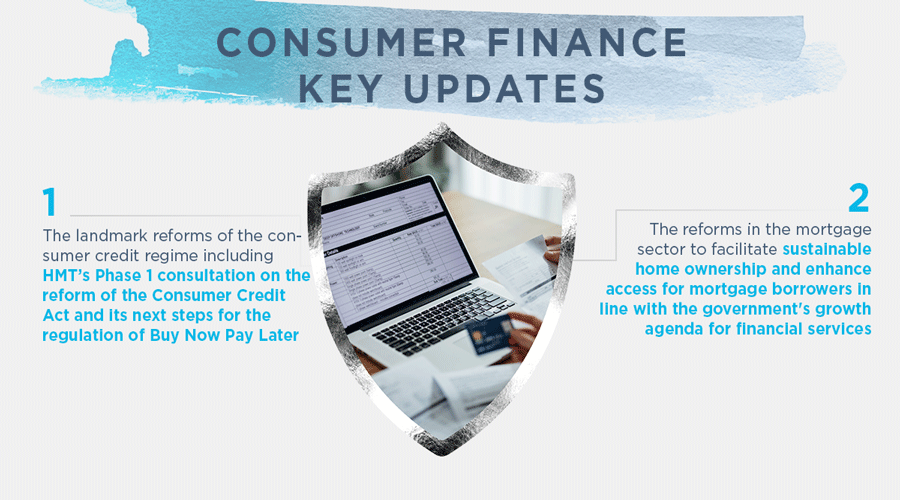On 15 July, HM Treasury announced Leeds Reforms which represent the most comprehensive overhaul of the UK financial system in over a decade, with the aim of making the UK the leading global destination for financial services by 2035. The reforms include radical changes in the UK mortgage regime to facilitate sustainable home ownership and enhance access for mortgage borrowers in line with the Government's growth agenda for financial services. These include:
- A permanent Mortgage Guarantee Scheme to support high loan-to-value lending;
- Introduction of simplified remortgaging rules, including removing the requirement for a full affordability assessment when customers wish to reduce their mortgage term. These changes were finalised by the Financial Conduct Authority (FCA) in its recently published policy statement. You can read more on these changes in our consumer finance newsletter here; and
- Lastly, more flexible lending rules to help first-time buyers. In June 2025 the FCA published a discussion paper (DP25/2) on these measures.
In this issue we discuss some of these reforms and relevant considerations for firms to assess how these changes may impact their systems and processes for mortgage lending.
Increasing the de minimis threshold and review of the loan-to-income flow limit
In her 2025 Mansion House speech the Chancellor spoke about the Government’s support for the recent changes by the Financial Policy Committee (FPC) to the de minimis threshold for the loan-to-income (LTI) flow limit in mortgage lending. These were implemented immediately by the Prudential Regulation Authority (PRA) and the FCA, enabling tens of thousands more people to access mortgages.
The LTI flow limit restricts the proportion of high LTI mortgages (above 4.5 times income) to 15% of a lender’s annual new residential mortgage loans. Following a recommendation from the FPC, the regulators have increased the threshold from £100 million to £150 million in annual mortgage lending, exempting smaller lenders from the LTI flow limit.
This update reflects economic growth since the threshold's introduction in 2014 and aims to enhance competition, particularly benefiting smaller lenders. By increasing the de minimis threshold, the amendments intend to ensure that small lenders can extend a greater value of residential mortgage lending before being subjected to the LTI flow limit. The new rules and guidance took effect on 11 July 2025.
Following this the PRA has announced a review of its LTI flow limit rule. Firms should take notice that during the review, the PRA is offering a modification by consent, allowing lenders to disapply the 15% limit temporarily. Firms opting for this modification must provide detailed updates on their business plans, risk management frameworks, and monthly reports on high LTI mortgage approvals to the PRA. The modification is valid until 30 June 2026 or until the PRA completes its review and amends the rule. Firms wishing to apply must contact the PRA via email, with approvals published on the Financial Services Register. Lenders should also monitor any formal consultation by the PRA on changes to the LTI flow limit which may follow in due course.
Mortgage rule review: the future of the mortgage market
As mentioned above, the Government is also supporting initiatives to allow more flexible lending rules to help first-time buyers. The FCA’s discussion paper (DP25/2) explores potential changes to its mortgage rules to improve access to sustainable homeownership, encourage innovation and support economic growth whilst maintaining responsible lending standards. It also seeks to balance risk appetite in the mortgage market. The key areas for discussion are:
- Responsible Lending Rules: Exploring changes to support first-time buyers, the self-employed, and those with variable incomes, while considering alternative affordability assessments (e.g., rent-based affordability).
- Later Life Lending: Addressing the growing demand for products like lifetime mortgages and retirement interest-only (RIO) mortgages and enabling older borrowers to access housing wealth to support retirement.
- Customer Understanding and Innovation: Enhancing consumer understanding of mortgage products, enabling innovation (e.g., AI-assisted advice), and reviewing disclosure and advice standards.
- Rebalancing Risk Appetite: Considering trade-offs between increasing mortgage access, potential house price inflation, and risks of arrears and repossessions.
You can read our article here where we share our insights on which areas of the UK mortgage regime are vulnerable to future changes. However below we call out some of the key factors firms may want to consider in assessing the impact of these changes to their mortgage business:
- A number of these proposed reforms will affect the firms’ current systems and processes including their training and competency, advisory and disclosure frameworks.
- While the proposals in relation to changes to the interest rate stress test could potentially increase consumer protection, it could also restrict lending requiring firms to stress at higher rates than they do today.
- The proposed alternative and rent-based affordability assessment could place more risk on the borrower than the current assessment that looks more widely at a customer’s financial position, ability to pay and the impact of likely future interest rate increases on affordability.
- Under the new rules lenders may be required to expand their lending criteria to accommodate mortgages for properties that may have been affected by climate-related events or have become uninsurable.
- The proposals in relation to affordability assessment, interest only mortgages and later life lending are likely to require firms to launch new offerings and product designs, adding to the cost of investment that they have made over the years in designing their systems around the FCA’s current rules.
- Lastly, possible changes to the disclosure regime will shift disclosure obligations from a standardised approach to an outcomes-based model where onus will be on firms to ensure that consumers are empowered to understand products on offer, to help them make informed decisions on what is appropriate for them. Firms may also need to build in new technologies, including AI-supported solutions, allowing them to deliver better outcomes for consumers through more personalised and tailored disclosures.







